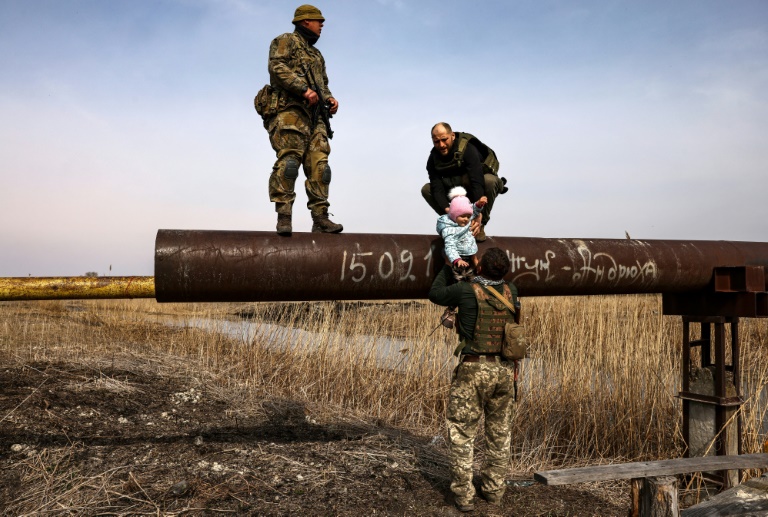The little girl in the pink bobble hat looks warily down at the water as the Ukrainian soldier carries her across a long, narrow pipeline on the frontline east of Kyiv.
Three-year-old Karolina Tkachenko and her family have walked an hour through a field strewn with burnt-out Russian armoured vehicles to flee their village.
Before their ordeal is over, they face a final trial — crossing a wobbly gas pipe that is some 50 metres (150 feet) long and sits three metres above a wide stream.
Her parents watch, hearts in mouths, as Karolina goes first in the soldier’s arms. Dressed in a blue coat, she clings to him as he walks tightrope-style.
They make it across safely.
The girl is handed over to other troops, and now it is the turn of her mother Karina, 21, who grips the soldier’s military webbing for balance as he leads her across too.
Karina runs to her daughter and hugs her, a look of joy on her face. Her husband comes last across the half-metre-wide pipeline.
“It was okay to walk across a pipe, not scary,” Karina grins, while Karolina strokes a brown and black puppy the family brought with them in a bag.
“My daughter is fine.”
But their journey shows that in the villages outside Kyiv, people will do anything to escape the Russian invasion.
– ‘Hope this will end’ –
Ukraine said on Tuesday that its forces had “liberated” three more villages near Brovary, a town 20 kilometres (12 miles) east of Kyiv on the frontline with Russian forces.
Moscow has promised to scale back attacks on the capital more than a month into the invasion after its attempts to encircle Kyiv stalled.
Yet the conditions for civilians in the area remain unbearable for many, with the Russians leaving devastation in their wake.
The pipeline linking two fields filled with the stubble of crops is the only route out for some people in the area.
“There’s just no other option,” said Andriy, 36, the soldier who carried little Karolina to safety.
Several people a day were crossing it, he said, as the Ukrainian military escorted a small group of journalists to villages that it asked not to be identified for security reasons.
“The girl is fine. Yesterday there was a child who was also calm, he did not cry,” added the soldier, who goes by the nom de guerre “The Beard”.
As she gathered up their meagre belongings, Karina Tkachenko said they had decided to leave because the Russians had occupied the village next to hers.
“The shooting was happening, we heard all the noises,” Karina said.
“The shops are closed, there’s no delivery of supplies. The bridge is also blown up, we can’t go for the groceries through there.”
They finally escaped after calling friends to find a way past the Russian forces. Now they will go to live with her husband’s relatives in another village.
“I hope all this will end soon, and I will go back to my work.”
– ‘Wave of adrenaline’ –
The field through which her family fled lies over a low grassy ridge, marked with tank tracks and littered with abandoned Russian military uniforms.
Two Russian armoured personnel carriers sit in a barren wasteland of sunflower stalks, these symbols of Moscow’s military might now scorched orange and black.
The force of the explosion that destroyed one of the vehicles has blown the turret several metres away, where it lies on its side in the sandy soil.
An acrid smell rises from inside the charred armoured personnel carriers, which are filled with ash and the remains of machine guns and electrical equipment.
Ukrainian soldiers in a network of trenches describe the battle in early March, which started when they suddenly saw Russian tanks roll over the ridge.
“It’s a huge wave of adrenaline,” says Serhiy, a young soldier wearing an olive-green hat, who asked to be identified only by his first name.
Emerging from the trenches that stretch snake-like over the fields, Ukrainians opened fire with everything they had, finally driving the Russians back, he said.
Serhiy himself was lucky to survive.
“A bullet entered the left side of my helmet and exited from the other side. And because the helmet was not fixed firmly, my head turned around, and I fell down,” he said.
He lived to fight another day, and as winter turns to spring he surveys the sunlit horizon over which Russia’s troops still lurk.
“It’s beautiful here,” he says with a wink.










